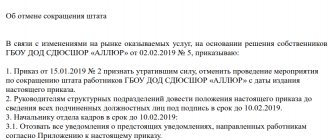Can't cut it, leave it
According to Article 261 of the Labor Code of the Russian Federation, it is impossible to dismiss due to staff reduction:
Articles on the topic (click to view)
- What to do and where to go if you are not paid upon dismissal
- What to do if you are laid off at work
- What to do if the employer does not want to fire at his own request
- What to do if the date of the dismissal order is later than the date of dismissal
- What to do if the employer does not give the work book after dismissal
- What to do if you didn’t work officially, you were fired, you didn’t get paid
- What is the employer obliged to give the employee on the day of dismissal?
- a pregnant woman;
- a woman with a child under 3 years old;
- a single mother who is raising a disabled child under the age of 18;
- a single mother raising a child under 14 years of age;
- another person raising the above children without a mother;
- parent or guardian if he is the sole breadwinner of a disabled child under 18 years of age or a large family with a child under 3 years of age.
In addition, according to Article 82 of the Labor Code of the Russian Federation, employees who are members of a trade union can be dismissed only with the consent of the primary trade union organization. Reductions are not permitted during an employee’s illness or vacation.
Important:
The law does not contain a ban on layoffs of working pensioners and persons of pre-retirement age. Workers in this category may be dismissed due to layoffs on a general basis. The employer is obliged to follow the standard procedure: warn the employee in writing about the upcoming layoff at least two months in advance and offer him another vacancy.
Who has the priority right to retain a job?
The Labor Code requires that when laying off employees, the employer must retain employees with higher qualifications and labor productivity (Article 179 of the Labor Code of the Russian Federation). But the preemptive right applies only when the number of staff is reduced - that is, if the number of employees occupying the same positions decreases. For example, an employer decided to retain only two out of five sales managers. By law, he must leave those who do the job better.
If employees are equal in terms of qualifications and productivity, the following persons have a preferential right to retain their position:
- persons who support two or more disabled family members;
- persons in whose family there are no other independent workers;
- employees who received a work injury or occupational disease while working for this employer;
- disabled veterans of the Second World War and disabled combatants in defense of the Fatherland;
- employees who improve their skills at the direction of the employer without interruption from work;
- persons who have a preferential right to remain at work under a collective agreement (Part 3 of Article 179 of the Labor Code of the Russian Federation);
- persons who received radiation sickness or other diseases in connection with the Chernobyl disaster.
In practice, the pre-emptive right is not always respected. However, an employee can use this legal requirement to protect his rights in court.
Where to go if you are being laid off illegally
If you have reason to believe that your employer is laying you off unreasonably, you can challenge the dismissal in court. A claim for reinstatement at work must be filed within a month from the date of receipt of a copy of the dismissal order or work record book (Article 392 of the Labor Code of the Russian Federation).
If you liked the article, you need to click “Share” below to distribute the article.
Thank you for attention!
Six payments upon voluntary dismissal
, you can read More >>>
What do you have to pay for? 8 employer payments you might not know about
can be found Read more>>>
Employee rights in Russia that you might not know about
can be found Read more>>>
Subscribe to 9111.ru in Yandex.News Subscribe
Who can't be laid off in 2021
As always, we will try to answer the question “Who can’t be laid off in 2021.” You can also consult with lawyers for free online directly on the website without leaving your home.
If you have any questions, you can ask them in the comments after the article or to our lawyer on duty. Contents Job loss is the biggest problem that can be caused by a financial and economic crisis. To get out of a difficult financial situation, organizations resort to optimization of the production process. As part of optimization, staff reductions are often made.
Who cannot be fired due to staff reduction according to the Labor Code of the Russian Federation as amended in 2021?
Union notification of layoffs
- 4.2 2. Notification of the employment service
- 4 Procedure for dismissal due to layoffs in 2021 4.1 1. Notification of the trade union about layoffs
- 4.2 2. Notification of the employment service
- 4.3 3. Drawing up an order for reduction
- 4.4 4.
This is important to know: When to pay taxes upon dismissal
- 1.1 Staff reduction
Dismissal due to staff reduction in 2021: registration, what payments and compensations are due to employees
These include: single parents raising a child who is disabled and under the age of eighteen; single parents raising a child under fourteen years of age; women with children under three years of age; parent (or other legal representative) is the sole breadwinner of a disabled person
Expert opinion
Polyakov Pyotr Borisovich
Lawyer with 6 years of experience. Specialization: civil law. More than 3 years of experience in drafting contracts.
- single parents raising a child who is disabled and under eighteen years of age;
- single parents raising a child under fourteen years of age;
- women with children under three years of age;
- a parent (or other legal representative) is the sole breadwinner of a disabled person under eighteen years of age, provided that the second parent is not employed;
- parent (legal representative) is the sole breadwinner of a child under three years of age in a family raising young children (three or more), if the other parent does not work;
- pregnant women.
Basic rights of an employee upon layoff
When answering the question of what rights are guaranteed to an employee upon redundancy, with some degree of convention they can be grouped into several categories. The most important ones are as follows:
- right to advance warning;
- offering alternative options;
- maintaining the order of priority when determining the list of dismissed employees;
- the presence of protected categories of employees;
- payment of compensation provided for dismissal due to reduction of compensation.
Each of the listed rights of an employee who is laid off due to staff reduction in 2021 requires more detailed consideration.
About abbreviation
Who is not subject to reduction if the number of departments with employees of the same positions is reduced? The one who has the right of first refusal. Persons with higher labor productivity and qualifications have this right (Article 179 of the Labor Code of the Russian Federation).
You cannot fire if the employee agreed to the transfer
For seasonal workers, the notice period is much shorter. It is seven calendar days. And employees with whom an employment contract has been concluded for a period of less than two months must be notified at least three calendar days in advance.
- who support more than 2 dependents (for family reasons);
- individually supporting their family (when there are no other sources of income other than the salary of a specific employee);
- who acquired illnesses associated with their professional activities, suffered injuries and injuries at an enterprise that is reducing staff;
- recognized as combat disabled;
- who, on the initiative of managers, improve their working skills in one way or another, without ceasing to fulfill their work obligations.
Who can't be cut
Development of an enterprise and optimization of its efficiency sometimes require staffing reductions. Employers and employees need to know who cannot be laid off when reducing the staff of the Labor Code of the Russian Federation. For some, this knowledge will allow them to prevent violations of their rights, while for others they will not end up as a defendant in court.
Actions in case of wrongful dismissal
As a rule, HR departments and departments involved in hiring and firing are well aware of those employees who, in accordance with the requirements of labor legislation, are not subject to redundancy. They inform managers about this in order to avoid incidents with regulatory and judicial authorities. If, despite this, the dismissal of an employee belonging to the category of “untouchable” does take place, then his reinstatement in the workplace will be carried out through the court. A wrongfully dismissed employee who is not legally subject to redundancy must take action. First, you should file a complaint about the illegal actions of management with the labor inspectorate or the prosecutor's office. These authorities will check the legality of management’s actions for compliance with the norms of the Labor Code of the Russian Federation. The next step is filing a claim in court. After the court makes a decision declaring the reduction illegal, the employee will be immediately reinstated, since court decisions of this category are those that require immediate execution. He is also required to pay him the money he did not receive due to being forced to not attend work.
If you were laid off due to redundancy, what should you do? You can contact several authorities. To begin with, you can send a written application to the trade union organization of the enterprise. The union must respond to the complaint within a week. An incident of wrongful dismissal due to reduction may be considered by the Federal Labor Inspectorate and the Prosecutor's Office. If the trade union organization and the labor inspectorate do not reveal any violations of the procedure, a lawsuit can be filed. This can be done within a 90-day period from the moment the employee learned of a violation of his labor rights. If the dismissed employee decides to challenge the termination of the employment contract, the statement of claim must be filed within 30 days from the date of issue of the work record book or a copy of the relevant order. Wrongfully dismissed employees do not pay fees and other legal costs. If dismissal due to reduction is recognized as unlawful, the employee is reinstated at his previous workplace by the body that was authorized to consider the labor dispute. In this case, the employee is compensated for the average salary for the period of forced absence or the difference for the period of performing low-paid work, as well as moral damages.
The amount of severance pay may be disputed. In this situation, the organization pays the employee the undisputed portion of the amount. The remaining portion is paid based on an agreement between the employee and management or by court decision.
Payments to those laid off due to redundancy
If an employee is fired due to staff reduction, he must receive severance pay, the amount of which is equal to the average monthly earnings. Within two months, the employee is paid severance pay while searching for a suitable job. This payment can be made in the third month if the dismissed employee contacts the employment service within 14 days after termination of the employment contract and does not find a suitable job.
- Pay wages for days actually worked;
- Compensate for unused vacation days;
- Pay severance pay;
- Compensate wages for 2 months or until the employee gets a new job.
This is important to know: Dismissal to care for a child under 14 years of age without work
If an employee belongs to one of the above groups, he cannot be dismissed due to reduction. If this does happen, the employee has the right to be reinstated in his position through the court. In this case, it is also possible to recover money for the period that the employee was absent from the workplace.
Employee rights
- The sole breadwinner of the family in the absence of other sources of income;
- Workers injured at work;
- Employees with 3 or more dependent children;
- Those on maternity or child care leave;
- Single mothers;
- Women with a child under 3 years of age;
- Pregnant women;
- Workers under 18 years of age;
- Employees undergoing advanced training courses at the time of layoff;
- Disabled employees on sick leave;
- Disabled people.
Step 2. An expert commission is assembled to evaluate candidates for redundancy. The formation of such a body is recorded in the order, as is the list of its members. Usually these are personnel officers, lawyers, deputy directors, heads of departments, and trade unionists.
Step 5. A meeting (and possibly more than one) is held at which the council discusses the candidates. Each meeting is recorded. It is important to compare identical positions. For example, it is unacceptable to compare the qualifications of a chief accountant and a primary accountant. If the reconciliation reveals equal indicators, then of the two employees, the one who has preferential rights is retained. If they turn out to be the same, the director will have to make a personal subjective decision.
List of persons who cannot be dismissed due to reduction
- having more than two dependents. Please note that dependents include not only children, but also elderly parents, disabled relatives, and other relatives who live on the income of a working loved one and, for objective reasons, cannot earn their own living;
- the only earner in the family;
- who lost his health while working for this employer;
- improving their qualifications without interruption from work;
- disabled combatants.
If the company does not have a job that matches the employee's qualifications, the employer may offer a lower-level position in the local area. The employer is obliged to offer vacancies in other localities if this is provided for in collective or labor contracts or agreements.
The Labor Code prescribes to the employer who he should “sacrifice” last. This information is contained in Article 179 of the Labor Code of the Russian Federation. If there are two identical positions, then employees with higher labor productivity and higher qualifications should be retained in the company.
Who cannot be fired due to reduction?
- pregnant women,
- women with children under three years of age,
- single mothers raising a child under 14 years of age (disabled child under 18 years of age),
- other persons raising these children without a mother.
In 2021, amendments were made to the Labor Code of the Russian Federation, which indicate that in the notification to the employee, in addition to the dismissal period, the employer must offer another option that will help avoid layoffs. For example, another position or short working hours. Unfortunately, there are not always vacancies available.
They won't drive us away
A reduction in staff or number of employees is a legal reason for terminating an employment contract at the initiative of the employer, Rostrud explained to RG-Week. It is provided for in paragraph 2 of part one of Art. 81 Labor Code of the Russian Federation. If an employee falls under this “sword of Damocles,” there is, as a rule, nothing to oppose to the authorities. And yet, for some categories of workers, the Labor Code provides for increased protection measures. Which ones exactly - Rostrud experts explain.
Who should not be “redundant”?
Termination of an employment contract is not permitted:
- if the employee has a child under three years old;
- if an employee is raising a child under 14 years of age alone, and if the child has a disability, then the age increases to 18 years;
- if the employee has a large family (three or more young children), incl. a child under three years old or a disabled child, and the other parent does not work.
In addition, workers who are members of a trade union can be dismissed only with the agreement of the primary trade union organization (part two of Article 82 of the Labor Code of the Russian Federation).
Important: it is not allowed to dismiss an employee due to staff reduction during his illness or vacation.
How is the selection of employees to be laid off?
The law requires that when making redundancies, the employer retains workers with higher qualifications and higher labor productivity (part one of Article 179 of the Labor Code). In reality, of course, this does not always happen. But at least this requirement, enshrined in the Labor Code, can serve as a basis for an employee to defend his rights in court. If, of course, he can prove that he works better and with greater productivity than those who remained on staff.
If you have to choose between employees who have approximately the same professional qualities, the employer is obliged to give preference to:
- family with at least two dependents (for example, two young children or one child and a disabled spouse);
- workers - the only breadwinners in the family;
- employees with disabilities, if an occupational disease or injury that led to disability occurred at this enterprise;
- combat disabled people;
- employees sent for on-the-job training.
How does the reduction happen?
The employee is notified of dismissal two months in advance, against signature. If he agrees, the employment contract can be terminated earlier, while the employee receives additional compensation in the amount of the average salary for “unfinished” days.
Important: dismissal due to staff reduction is allowed only if it is impossible to transfer the employee with his written consent to another vacant position or work (both corresponding to the employee’s qualifications and a lower position or lower paid job), which the employee can perform taking into account his state of health . The employee must be offered all available vacancies.
What does a “redundant” employee get?
- severance pay in the amount of the average monthly salary;
- the average salary is maintained for the duration of employment, but no more than two months from the date of dismissal.
It is important to know: if an employee contacts the employment service immediately after dismissal (no more than two weeks from the date of termination of the employment contract), and they could not find a new place for him, then the average salary can be retained for another one (third) month.
How to get money for the second and third months?
The dismissed employee must present the employer with a work record book to confirm that he did not get a job, as well as a passport. To receive money for the third month, you must also submit a decision from the employment service agency.
When is the money paid?
All money due to the employee is paid to him on the day of dismissal. On the same day he is given a work book.
Important: if the employee and the employer cannot agree on the amount of payments, in the event of such a dispute, the employee is paid the undisputed part of the amount.
How to go to court if there is a conflict?
This can be done within three months from the day the employee’s rights were violated. For disputes about dismissal, the period is one month from the day the employee received the dismissal order or work book (part one of Article 392 of the Labor Code of the Russian Federation). The court may accept the statement of claim later. You just need to present documents confirming that the delay was due to a valid reason, for example, due to illness.
Payments for staff reductions in accordance with the Labor Code of the Russian Federation
Employers are liable if they violate the rules of the procedure for dismissing employees when reducing the number of staff. If payment deadlines are violated, in accordance with Article 236 of the labor law, the employer is obliged to reimburse, in addition to the entire amount of money due to the employee, interest amounting to at least one three hundredth of the refinancing rate of the Central Bank of Russia for each day of delay. The same sanctions apply to employers in case of delay in payment of wages. If the employer does not fulfill the obligation to provide dismissed employees with vacant positions at the enterprise, this threatens him with a fine of 5-50 times the minimum wage in accordance with Article 5.27 of the Administrative Code.
Who should not be laid off?
; average monthly earnings for the period of employment within two months from the date of dismissal (including severance pay). At the end of the second month, if the employee presents you with a work book without a record of employment and writes a statement, pay him the average salary for the period of employment, including the severance pay paid on the day of dismissal (Part 1 of Article 178 of the Labor Code of the Russian Federation). If the former employee was employed in the middle of the second month, calculate the benefit in proportion to the time during which the employee was not employed. At the end of the third month.
Expert opinion
Polyakov Pyotr Borisovich
Lawyer with 6 years of experience. Specialization: civil law. More than 3 years of experience in drafting contracts.
Dear readers of our site! Our articles talk about typical ways to resolve legal issues, but each case is unique.
If it is determined that the employer has violated the layoff procedure, he faces significant fines. Individual entrepreneurs are subject to liability in the amount of up to 50 minimum wages; other organizations will receive a fine of up to 500 minimum wages. Accordingly, the employer is obliged to take all measures to lay off an employee within the framework of the law. To follow the procedure, the employer must know the procedure established by law.
Change of owner
The legislation does not contain the concept of “to lay off an employee.” However, Article 180 specifies which employee rights must be respected when an employee is laid off due to staff reduction or liquidation of an enterprise.
If there is a staff reduction at the enterprise, the employer must warn the employee about the upcoming dismissal two months in advance. In this case, a verbal notification is not enough; you must sign the corresponding order.
Perhaps the main advantage of this organization is the opportunity to receive unemployment benefits. Only those who are registered with the employment service have the right to this payment. Moreover, if you were fired due to staff reduction or in connection with the liquidation of an enterprise, unemployment benefits will not be accrued to you immediately, but only after you have received payments from the employer due to you for the period of employment, that is, two or three months after job loss.
This is important to know: What to do if you find out about pregnancy after dismissal
WHAT PAYMENTS ARE ALLOWED TO PEOPLE WHO LOST A JOB?
Every tenth employer, 12 percent, wants to introduce new non-material bonuses for employees. Companies providing business services intend to motivate employees most in this way, and companies in the financial sector least of all. Another ten percent of respondents decided to focus on one area of business, six percent decided to move due to company expansion.
It is necessary to note that according to Art. We have to wait for him to go to work. This rule is also relevant for situations where layoffs are carried out to reduce the number of employees. Dear readers, if you see an error or typo, help us fix it! We will learn about the inaccuracy and correct it. You may be interested in:. How many points will your company receive from Rostrud? Is it necessary for an LLC without employees to submit a report on the average headcount? Subscribe to the daily newsletter. Every weekday we will send you everything that was published yesterday. You won't miss anything!
After making the appropriate decision, when reducing the number or staff of employees, the employer, the person in charge or members of the commission find out which of the employees whose positions in the unit are abolished has a preferential right to remain in the organization Art. It is available to state employees who have higher qualifications if the state has employees performing the same duties.
Who can't be laid off?
Large enterprises can seek professional services; you can always get advice from regulatory and executive authorities, for example, from the local Labor Inspectorate. The calculation is made on the last working day, as is established for all other cases. Composition of payments:. According to Art. If an agreement is reached to terminate the contract before the expiration of the notice period, additional compensation is paid based on average earnings for the period remaining before the expiration of the notice period.
If he refuses to familiarize himself with the written notice, then it is sent to him at his home address by registered mail with notification. It is also necessary to draw up an act of refusal to read the written notice. Subsequently, this will help the employer if a former employee goes to court with a claim about the illegality of the dismissal procedure. The employer will be able to document that he did everything to comply with the procedure, and it was the employee who violated it.
Without options you can't fire
This story took place in the Krasnoyarsk region. There, the employee worked in the organization for almost three decades, after which he was laid off. He was not the only one laid off, but, as he later found out, the organization offered his colleagues several vacancies to choose from.
But they didn’t offer him anything. The employee was naturally indignant. And he went to defend his labor rights in court. But there, to his surprise, he lost. But when, challenging the losses in local courts, this man reached the Supreme Court of the Russian Federation, they requested the case, studied it and agreed with his arguments.
Such explanations of the procedure and rules for reducing employees in organizations may be useful not only to our hero, but also to everyone who may encounter a similar situation. Although it is known that the Supreme Court of the Russian Federation gives such clarifications primarily for its colleagues in regional courts. But such comments and “working on mistakes” also help many ordinary citizens who are faced with a situation in their lives where they are forced to go to court.
The main argument, which was put forward by the Judicial Collegium for Civil Cases of the Supreme Court, sounds like this: if there are vacancies in the organization at the time of layoffs, then the company cannot choose which of those being laid off will be offered free rates and who not.
Our hero worked at his enterprise for a very long time - twenty-nine years. And recently I received notice of an impending layoff. The citizen considered this attitude towards him on the part of the employer to be incorrect, since he was not offered a different rate. Although, according to his information, such vacancies were available.
To offer an employee all vacancies during layoffs is not the employer’s right, but an obligation
Therefore, the plant employee went to court. He stated in court that the company had vacancies that he could easily fill. The plaintiff listed only a few of them - an office inspector, a company bus driver, a storekeeper. In reality, the list was many times longer.
The citizen was offended for good reason - as he learned, the listed vacancies were offered by the employer to other laid-off employees. And they accepted them. He had only one offer - dismissal.
Speaking in court, the plaintiff argued that the employer had violated his labor rights and asked the court to reinstate him in his previous position - as a milling machine operator. He asked the court to award him all his earnings for the time he was forced to stay at home and add moral damages to this amount.
The defendant, a representative of the organization, did not agree with the former employee’s claim and stated that there were no violations of labor laws at the enterprise. They decided to transfer the tasks performed by milling operators to third-party specialized organizations. This, according to management, will increase work efficiency. The plant offered all the rates available at that time to other employees, and they agreed. According to the employer’s representative, there was no free space specifically for our hero, so he was not offered an option for the position.
According to a representative of the organization, which of the dismissed employees is offered a vacant position and who is not offered anything is decided by the employer himself, “since this procedure is not regulated by law.”
The court heard all parties and sided with the defendant. The court wrote in its decision: “According to Art. 81 of the Labor Code (“Termination of an employment contract at the initiative of the employer”), an employee can be laid off if he cannot be transferred to another position. The court also remembered the resolution of the Plenum of the Supreme Court of the Russian Federation (dated March 17, 2004 No. 2) “On the application of the Labor Code by courts.”
The resolution states that it is possible to dismiss due to reduction if a person did not have a preferential right to remain at work and he was warned about dismissal two months in advance.
The Zheleznogorsk City Court of the Krasnoyarsk Territory emphasized: the plaintiff knew in advance about the termination of the employment contract, because the notice contained his signature. And there was no ban on dismissal, as well as other vacant positions. Therefore, the court rejects the claim. The appeal on the plaintiff's complaint checked the case and completely agreed with the lower colleagues. And the stubborn citizen went to the Supreme Court for the truth.
They studied the case and said the following: Article 180 of the Labor Code - “Guarantees and compensation to employees during the liquidation of an organization, reduction in the number or staff of an organization's employees” - obliges the employee to offer another position in the event of a reduction. This is a guarantee against arbitrary dismissal of specialists. At the same time, the employer must find alternative rates for all dismissed specialists. And they will already decide whether to agree or not.
The Supreme Court stated the following: their colleagues from the Krasnoyarsk Territory “illegally agreed with the defendant’s arguments that the employer himself decides which of those being fired is offered open vacancies.”
To offer an employee all available vacant positions in the event of a layoff is not the employer’s right, but his responsibility, the Supreme Court of the Russian Federation specifically emphasized.
According to the high court, in the dispute the local courts had to establish the following: whether from the moment of notification until the day of dismissal of the plaintiff there were vacancies that would correspond to his qualifications, or lower positions with a lower salary.
The Supreme Court also emphasized that local courts did not give a legal assessment to the general director’s order to reduce staff. Therefore, the conclusions of the lower authorities about the legality of the plaintiff’s dismissal are erroneous.
As a result, the Judicial Collegium for Civil Cases of the Supreme Court of the Russian Federation completely canceled all decisions taken on this dispute and ordered the dispute to be reconsidered from the very beginning. But taking into account your explanations.
Notify employment authorities and trade union
Elected trade union body, in accordance with Art. 373 of the Labor Code of the Russian Federation, considers this issue within seven working days from the date of receipt of the draft order and copies of documents and sends its motivated opinion to the employer in writing.
Issue an order to terminate the employment contract
Downsizing is inevitable from time to time. But even in this case, the employer does not have the right to lay off some employees. Who, when and for what reason has special rights and “privileges” during staff reductions?
Severance pay and additional compensation
If the company's workforce is reduced, the employee has the right to receive severance pay. Its value is the employee’s monthly salary. A seasonal worker is entitled to 2 weeks of earnings. The stated benefit amount is the minimum. The provisions of a collective or individual employment agreement may provide for more significant severance pay.
Another right of an employee dismissed due to job reduction is additional compensation while looking for a new job. It is paid in the amount of the employee’s average monthly earnings. Thus, the total payment amount is two monthly salaries.
Important .
In the event of a layoff at an enterprise, the employee retains all rights granted regardless of the reason for dismissal. These include payment of compensation for unused vacation during the year.
Who cannot be fired due to staff reduction?
Persons who cannot be dismissed on this basis are listed in Art. 261 Labor Code of the Russian Federation. These include:
- single parents raising a child who is disabled and under eighteen years of age;
- single parents raising a child under fourteen years of age;
- women with children under three years of age;
- a parent (or other legal representative) is the sole breadwinner of a disabled person under eighteen years of age, provided that the second parent is not employed;
- parent (legal representative) is the sole breadwinner of a child under three years of age in a family raising young children (three or more), if the other parent does not work;
- pregnant women.
This category of workers cannot be laid off under any circumstances.
Protected categories of employees
The legislation provides certain categories of workers with a preferential right to retain employment in the event of layoffs. Two criteria for their determination - qualifications and productivity - have already been announced. In addition to them, other things being equal, the employer, in the process of making a decision on dismissal, is obliged to keep the following categories of employees employed at the enterprise:
- with two or more dependents;
- the only worker in the family;
- who has become disabled or suffered an occupational disease/injury;
- war veteran;
- undergoing advanced training courses or other types of professional training at the expense of the employer.

The legislation allows for the provision of preferential rights to other categories of employees if this is provided for by the collective agreement in force at the enterprise. Some categories of employees cannot be dismissed due to reduction at all. These include:
- pregnant women;
- mothers raising a young child or a disabled child;
- mothers whose child is under 3 years old;
- sole breadwinners in the family;
- employees who are on vacation or sick leave.
Important . To dismiss a minor employee due to redundancy, it will be necessary to obtain the consent of the relevant commission and labor inspectorate.










